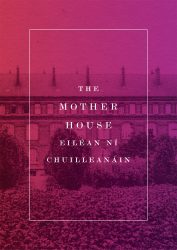Poetry Review: “The Mother House” — Poems with the Demeanor of Nuns
By Jim Kates
In these poems, contemplation, serenity, and service are the order of the day.
The Mother House by Eiléan Ní Chuilleanáin. Wake Forest University Press, 80 pages, $13.95.

The first thing you should know, before you read the review, is that Eiléan Ní Chillleanáin and I are friendly and collegial. She has been publishing my poems and translations for about 40 years now in Cyphers, the Dublin magazine she founded with her late husband MacdaraWoods in 1975; and I’ve been reading her work since 1978. I am no objective reviewer: I am a fan. Large chunks of the English-speaking world have been reading Ní Chuilleanáin’s work for just as long as I have, and are just as great fans. She has a distinguished career as a scholar and a poet, including an International Griffin Poetry Prize. You can look up the rest, if you care about these things. What’s surprising is that she is not more generally known in the American literary world, even though she has read and taught widely in the United States.
When Ní Chuilleanáin said she was sending me her newest book of poems, The Mother House (by my count, her 12th) she gave me a friendly warning — and “warning” was her own word — “It’s full of nuns.”
There are not so many in the poems as she had led me to think, and they are not the nuns of discipline and caricature, but they are important people, as you might expect in a book called The Mother House. Ní Chuilleanáin begins her book with the most famous nun in Ireland, the 18th-century educational pioneer Nano Nagle:
She was tired, someone gave her
a chair in a shop. Rested
and then away, in the street, on the move. (“An Imperfect Enclosure”)
The poet speaks quietly, matter-of-fact, gentle, and far-reaching. Like Nagle, throughout the book Ní Chuilleanáin is “out in all weathers.” But the weathers of the book are the weathers of Ireland, where the operative adjective is most often soft. Voices insistent but muted, as if in the business of a cloister.
Equally important to note is that the poet begins her book in the 18th century. In Irish literature, as in the country’s consciousness, the past permeates the present in a way that would be seen as academic in most other cultures, but it is integral to the Irish national identity. (When I was hitchhiking in Ireland in the late ’70s, drivers who picked me up would ask what I thought about Cromwell as a way of asking me indirectly what I thought about the Troubles.) National history for Ní Chuilleanáin is family history, and family history is current affairs.
“Remember James Connolly,” that martyr of the Easter Rising, we are enjoined,
how his life would end, and was content because
men and women would succeed him, and his testamentwas there, he trusted them. . . .
— then the reader comes, and it flowers again, like a painted room. (“For James Connolly”)
Ní Chuilleanáin recalls “Maria Edgworth in 1847” in the angriest poem in the book (“angry” being the dominant word in the poem), where these kindly and angry lines stretch “out across the Atlantic” again, as Irish history does, into America, where “men are far from home when her gift reaches them, the trace /of their work unraveling like a worn thread of wool.”)
At the same time, the book is also permeated by a “tight bundle of grief” for more recent memories and losses, including that, unstated directly but not unacknowledged, of Woods, who died just two years ago, and the stated elegy for their colleague Leland Bardwell, who had died just a year before. After all is said and done, these griefs are affirmative.
shone steadily in the deep shade of the arch.
This is the short form, she said, we must
do this at least. This much we owe their names. (“An Informant”)
And all the other voices who people this book are memorialized in their quiet, gentle, matter-of-fact existence, with the demeanor of nuns.
in a flaw — how knowledge travels all the way
down through a body and burns into the floor.
That was drama . . . (“Sister Marina”)
In these poems, contemplation, serenity, and service are the order of the day.
Jim Kates is a poet, feature journalist and reviewer, literary translator and the president and co-director of Zephyr Press, a non-profit press that focuses on contemporary works in translation from Russia, Eastern Europe, and Asia. His latest book is Paper-thin Skin (Zephyr Press), a translation of the Kazakhstani poet Aigerim Tazhi.

